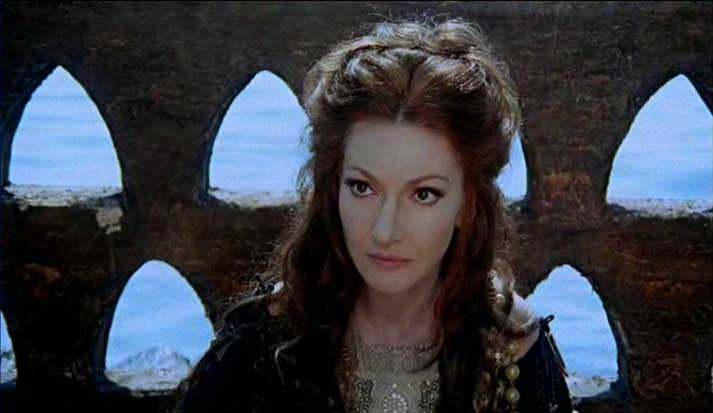.

Maria Callas in Pasolini's "Medea" (1969).
Medea is a film by Pier Paolo Pasolini based on the plot of Euripides' Medea (play). It stars the famous opera singer Maria Callas in her only film role; however, she does not sing in the movie. Many scenes are shot around sunset, there are long stretches without dialog, and the soundtrack is composed of tribal music. These elements work together to create a strange hypnotic mood.
Plot
Spoiler warning: Plot and/or ending details follow.
The first half sums up the story of Jason and the Argonauts as they travel to Medea's barbarian land in search of the golden fleece. In fitting with the soundtrack, Pasolini depicts Medea's people to be somewhat like an African tribe in their costumes and dances. They commit a gruesome human sacrifice, and use the organs and blood to fertilize their crops. The depiction of the sacrifice, in which the victim is bound to a wooden structure and the villagers not only fertilize crops with his body and blood but also consume them, has obvious parallels to the Christian rite of communion, and shows the influence of James George Frazer's anthropological account of the Crucifixion story.
Meanwhile, Jason and his comrades have arrived and are shown pillaging the locals. Medea gets assistance from her brother Absyrtus to steal the golden fleece, and they take it to Jason. When the golden fleece turns up missing, troops are sent after them. Medea kills her brother, chops him up, and then leaves a trail of his body parts. Each time the troops come upon a part, they must stop and carefully attend to the part, and in this way Jason and Medea are able to escape.
When they return to Jason's homeland, Medea is stripped of her native barbarian garb and dressed in Greek fashion. The film soon begins to pick up the story from Euripides Medea, however it jumps around in the sequence of events. The burning of Glauce and her father Creon by Medea's gift is shown before the events leading up to it. Jason had two sons with Medea, but decided to remarry to Glauce. Medea and her sons are ordered by Creon to leave the country. In her jealousy and desire for revenge, she sends her children with a gift. Her gift is a robe that causes Glauce to catch fire, and her father burns as he attempts to put her out. When this scene comes back for a second time, an alternative end not in Euripides is shown. Glauce throws herself from a tower, and her father follows her moments later.
In the end, Medea calmly kills her own children after bathing them and rocking them to sleep. She sets fire to the place and has a final argument with Jason. She doesn't allow him to have the bodies of their sons for burial. This is where the film ends; there is no escape on the chariot of her sun god kin.
Links
| Ancient Greece
Science, Technology , Medicine , Warfare, , Biographies , Life , Cities/Places/Maps , Arts , Literature , Philosophy ,Olympics, Mythology , History , Images Medieval Greece / Byzantine Empire Science, Technology, Arts, , Warfare , Literature, Biographies, Icons, History Modern Greece Cities, Islands, Regions, Fauna/Flora ,Biographies , History , Warfare, Science/Technology, Literature, Music , Arts , Film/Actors , Sport , Fashion --- |
Retrieved from "http://en.wikipedia.org"
All text is available under the terms of the GNU Free Documentation License

